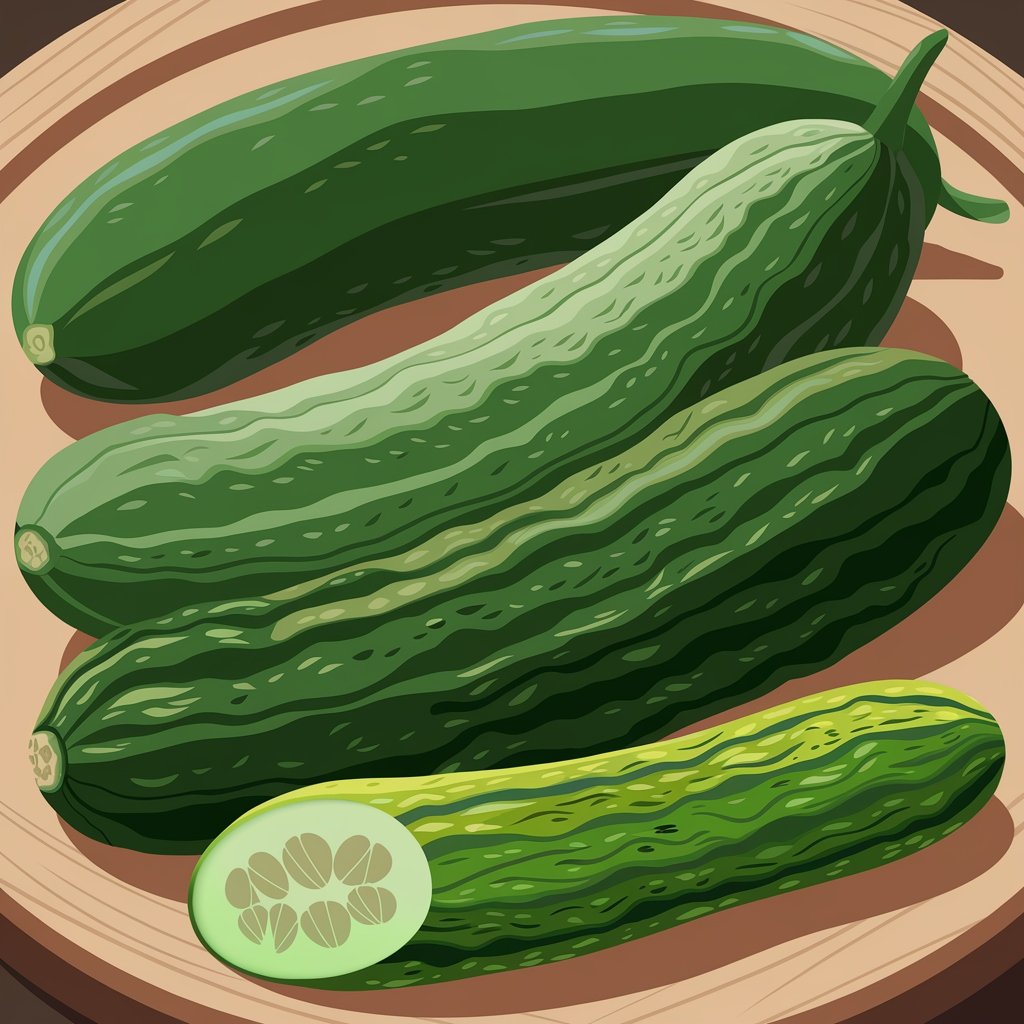Cucumbers are among the most versatile and refreshing vegetables, perfect for salads, pickles, and even skincare routines. Their crisp texture, mild flavor, and hydrating properties make them a favorite in kitchens and gardens alike. But did you know there are numerous types of cucumbers, each with unique characteristics? Whether you’re a gardener, a home cook, or a cucumber enthusiast, understanding the variety of cucumbers available can elevate your culinary or gardening experience.
Types of Cucumbers: An Introduction to Cucumber Varieties
When we think of cucumbers, the standard supermarket variety might come to mind. However, the world of cucumbers extends far beyond the common slicing cucumber. With differences in size, texture, taste, and use, cucumber varieties can be divided into two main categories: slicing cucumbers and pickling cucumbers. Additionally, there are specialty cucumbers that bring unique twists to the table.
Let’s dive into the vibrant world of cucumbers and explore their many types.
Slicing Cucumbers: The Salad Staple
Slicing cucumbers are the most familiar types of cucumbers. They are typically longer, with smooth, dark green skin, and are bred for their crisp texture and mild flavor. These are the ones you’ll find in most grocery stores and are perfect for fresh eating.
Common Varieties of Slicing Cucumbers
- Marketmore Cucumbers: Known for their disease resistance and consistent growth, these cucumbers are a favorite among gardeners. Their crisp texture and sweet flavor make them a top choice for salads.
- English Cucumbers: Also known as hothouse cucumbers, these are long, slender, and virtually seedless. Their thin skin doesn’t require peeling, making them perfect for elegant dishes.
- Burpless Cucumbers: These cucumbers have lower levels of cucurbitacin, the compound that can cause bitterness and indigestion. Burpless varieties are sweeter, making them ideal for snacking.
Pro Tip: For slicing cucumbers, always look for firm, dark-green specimens without soft spots or blemishes. They are best stored in the refrigerator, wrapped in a damp paper towel to maintain freshness.
Pickling Cucumbers: The Secret to Crunchy Pickles
Pickling cucumbers are smaller and bumpier, with a denser texture that allows them to absorb brine without becoming mushy. While they’re bred specifically for pickling, they can also be eaten fresh.
Popular Pickling Varieties
- Kirby Cucumbers: These small cucumbers are a staple for pickles. Their thick skin and firm flesh hold up well during the pickling process.
- Boston Pickling Cucumbers: Slightly longer than Kirby cucumbers, these are another popular choice for pickling due to their high yield and great crunch.
- National Pickling Cucumbers: Known for their uniform size, these cucumbers are ideal for producing consistent batches of pickles.
Pickling Tip
Always choose young cucumbers for pickling. Overripe cucumbers tend to be too soft and may not retain their crunch during fermentation.
Specialty Cucumbers: Unique Flavors and Exotic Looks
If you’re looking to add a bit of variety or intrigue to your dishes, specialty cucumbers are the way to go. These cucumbers come in unique shapes, colors, and flavors, offering something for the adventurous cook or gardener. For more inspiration on adding variety to your garden or kitchen, check out this guide on different types of peppers to explore other exciting vegetables that complement cucumbers perfectly.
Notable Specialty Cucumber Varieties
- Lemon Cucumbers: Round and yellow, these cucumbers have a mild, slightly sweet flavor. They’re perfect for adding visual appeal to salads.
- Armenian Cucumbers: Technically a melon, Armenian cucumbers are long, curved, and light green with a delicate, refreshing taste.
- Gherkins: Tiny and tart, gherkins are ideal for making sweet or dill pickles.
- Persian Cucumbers: Small and seedless, Persian cucumbers have a tender texture and rich flavor, perfect for snacking or garnishing.
The Culinary Versatility of Cucumbers

One of the reasons cucumbers are so beloved is their versatility. Here are some popular uses for different cucumber varieties:
- Salads: Slicing cucumbers like Marketmore or English varieties adds crunch and hydration to salads. For an inspiring dish idea, check out this refreshing brunch salad recipe that highlights how cucumbers can shine in creative meals.
- Pickles: Kirby or Boston cucumbers are perfect for creating homemade dill pickles or sweet bread-and-butter pickles.
- Snacks: Persian cucumbers or burpless varieties make great on-the-go snacks.
- Juices and Smoothies: Cucumbers can be blended into refreshing drinks for a hydrating boost.
Gardening Tips for Growing Different Types of Cucumbers
Growing cucumbers can be incredibly rewarding, especially when you know how to care for the different varieties.
Best Practices for Cucumber Cultivation
- Sunlight: Cucumbers thrive in full sunlight, requiring at least 6-8 hours a day.
- Soil: Well-drained, fertile soil with a pH of 6.0-6.5 is ideal.
- Watering: Regular watering is crucial, especially during fruit production. Aim to water at the base to avoid disease.
- Trellising: Many cucumber plants benefit from vertical support, which improves air circulation and makes harvesting easier.
Companion Planting
Cucumbers grow well alongside beans, radishes, and marigolds, which can deter pests and improve soil quality.
Health Benefits of Cucumbers
Cucumbers are not just delicious but also packed with health benefits:
- Hydration: With 95% water content, cucumbers are a fantastic way to stay hydrated.
- Vitamins and Antioxidants: They’re a good source of vitamin K, vitamin C, and antioxidants.
- Weight Management: Low in calories and high in fiber, cucumbers are excellent for weight loss diets.
Why Variety Matters
Understanding the different types of cucumbers allows you to make the most of this versatile vegetable. Whether you’re whipping up a refreshing cucumber salad, fermenting pickles, or growing them in your garden, each variety brings something unique to the table.
Cucumbers are more than just a crunchy addition to salads—they’re a versatile, nutritious, and fascinating vegetable with varieties to suit every taste and purpose. Whether you’re a seasoned gardener or a curious foodie, exploring the different types of cucumbers can inspire your next dish or planting season.
